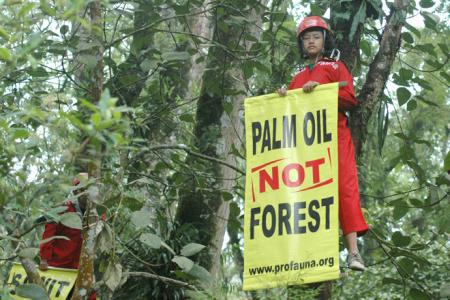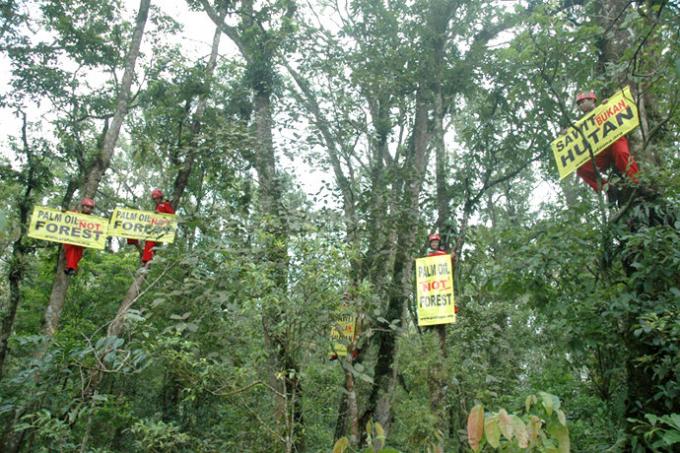Press Release: ProFauna Opposes Government’s Initiative to Reclassify Palm Oil Plantations as Forests
(04/07/2010) The Indonesian Forestry Ministry's proposal to define palm oil plantations as forests is a controversy showing government's two faces in the natural resources conservation efforts. Hadi Daryanto, the General Director of Forestry Production Assistance, on 10 February 2010 in a national media stated:
We (Forestry Ministry) are drafting the regulation to define palm oil plantations as forests. This means that we let palm oil companies get permission of Industrial Plant Forests (HTI). This is also an answer to the international critics that say the Indonesian palm oil plantations are the main cause of forest conversion into plantations. If palm oil is planted in forest area, there will be no more forest conversion into plantation.
In the Legislation number 41 year 1999, forest is defined as an ecosystem consisting of the natural resources dominated by trees and other living creatures that can be separable. With this clear definition, Indonesia has lost its forests with 1.7 million hectares deforestation pace per year. While reclassifying palm oil plantations as forests means deforestation of the remaining forests in Indonesia.
Radius Nursidi, ProFauna Forests Campaign Officer stated, "The Forestry Ministry should implement the forest protection efforts to save the remaining forests instead of issuing the initiative to reclassify palm oil plantations as forests". ProFauna thinks that this plan will trigger massive deforestation both by local people and palm oil companies.
Palm Oil Plantations VS Wildlife
 Notorious as a country with the fastest deforestation in the world, Indonesia is also known as a country which wild animals are highly threatened by extinction. Orangutan, Sumateran elephant, Sumateran tiger, and rhinoceros are the endemic to Indonesia species which are threatened by extinction partly due to forest conversion into palm oil plantation.
Notorious as a country with the fastest deforestation in the world, Indonesia is also known as a country which wild animals are highly threatened by extinction. Orangutan, Sumateran elephant, Sumateran tiger, and rhinoceros are the endemic to Indonesia species which are threatened by extinction partly due to forest conversion into palm oil plantation.
Wildlife habitat loss is caused by habitat fragmentation where the natural homes of wildlife are converted into palm oil plantation and this further causes human and animal conflict resulting wildlife killing and poaching.
ProFauna records show that since 2009, there have been 10 conflicts between humans and animals in Sumatera. In March 2009, two elephants trained by Elephant Conservation Center, Seblat, Bengkulu, were brutally killed near palm oil plantation and the perpetrator has been unclear until now. Wildlife poaching is high not only because of the demand in the black market but also forests conversion into palm oil plantations have given more access for poachers to commit the illegal wildlife crime. Aceh, Riau, Jambi, Bengkulu, Lampung in Sumatera, and other regions in Kalimantan are the locations where the conflicts between animals and palm oil plantations take place frequently.
Local People and Companies
In 2000, the Forestry Department reported that 30 millions Indonesians counted on directly the forestry for their livelihoods (Forestry Department, 2000). This figure must have been outnumbered by now.
The initiative to reclassify palm oil plantations as forests will be disadvantageous for the local people who depends their livelihoods on the forests. Those people will gain nothing but forest destruction and the disasters caused by it.
ProFauna Indonesia strongly opposes the reclassification. It is not populist and disadvantageous to Indonesian people. Instead of redefining palm oil plantations as forests, the government should stop the conversion of natural forests into palm oil plantations.
For further information, please contact:
Swasti Prawidya Mukti
(International Affairs Officer, ProFauna Indonesia)
Email: international@profauna.net
Mobile: +62 856 369 3611

